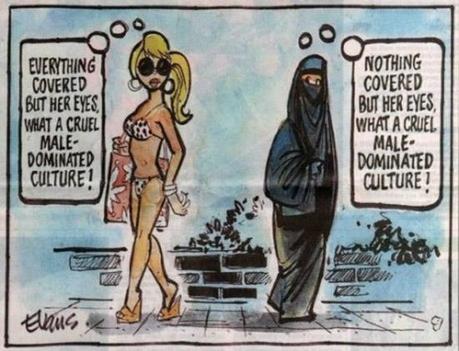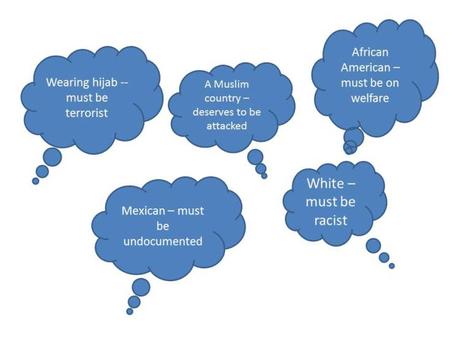
Every time I do a workshop on culturally responsive health care, I use the picture above. The audience sees it on a big screen and I give them a minute to take it in. Then I ask them "What's wrong with this picture?" It's not long until someone gets it; until someone says "They are stereotyping each other."
Exactly. It's pretty simple.I have quoted Chimamanda Ngozi Adichie before, and I will continue to quote her wise words: "The problem with stereotypes is not that they are incorrect; it's that they are incomplete." She doesn't stop there. She goes on to say "No one is a single story."
The cartoon characters have formed opinions based on stereotypes. Neither of them are capable of complexity, of seeing beyond the surface and trying to understand each other. It's an excellent cartoon showing the great divide between cultures and the danger of stereotyping.
I call this picture "The Great Divide." There is this chasm separating these two that has far more to do with the bubbles inside their heads than reality. Indeed, research tells us that if they did get to know each other, they may find they may have much in common.
In the book Who Speaks for Islam, tens of thousands of Muslims, both men and women, were interviewed in 35 countries. Here are just a few of the findings:
Counterintuitive Discoveries in Who Speaks for Islam? What a Billion Muslims Really ThinkWho speaks for the West?
Muslims around the world do not see the West as monolithic. They criticize or celebrate countries based on their politics, not based on their culture or religion.
Dream jobs
When asked to describe their dreams for the future, Muslims don't mention fighting in a jihad, but rather getting a better job.
Radical rejection
Muslims and Americans are equally likely to reject attacks on civilians as morally unjustified.
Religious mainstream
Those who condone acts of terrorism are a minority and are no more likely to be religious than the rest of the population.
Admiration of the West
What Muslims around the world say they most admire about the West is its technology and its democracy - the same two top responses given by Americans when asked the same question.
If we are honest with ourselves, we will recognize that much of the time we are like this cartoon. We live according to the bubbles inside our heads. None of us are immune. We form opinions and assumptions based on our cultural values, our religious views, our socioeconomic status, the media we listen to, watch or read, our countries of origin, the countries that adopted us, the families in which we were raised, and the list could go on.
Bubbles aren't inherently bad - often they help us to make good choices; but other times they prevent us from seeing people as they really are. They float down through our brains and cloud our vision.
My African American friends often fall victim to head bubbles. At one time, the director of my program was an African American woman raised in Ohio and transplanted to the East Coast. She was amazing and had degrees after her name that I could only dream about. But no matter where it was, when she walked into a new doctor's office or clinic, immediately the person behind the desk asked for her Medicaid card. The bubbles above their heads told them that she was black, so she was poor. She was black, so she must have public assistance in everything from food to insurance.
I have met some people who immediately assume if someone is from Mexico, they are undocumented.
Others who get onto planes and fear the woman in hijab who is sitting in front of them.
I've had people react to me according to who the bubbles in their heads tell them I am, and I am left frustrated and hurt that they were unwilling to find out more about me, unwilling to see a story beyond the surface.
Bubbles in our heads can convince us of all sorts of things.
The challenge is to be aware of them, to recognize them for what they are: stereotypes and biases that are rooted in our subconscious, and must be recognized and confronted.
I have found that the best way to confront these bubbles is through relationships. Once we form friendships and respect for the one who is other, we are less likely to react according to the bubbles in our heads. We are more willing to see both people and situations with the complexity that they deserve. We see beyond the surface and respond to people as individuals with inherent worth. We learn to love them.
A couple of years ago, Robynn said this on Communicating Across Boundaries: " In the very insightful book, Cross Cultural Servanthood, Duane Elmer encourages us to 'suspend judgement' -which essentially means the same thing as cultural humility. Don't make assumptions. Don't assign meaning. Don't guess. Don't interpret. Instead suspend judgement. Ask questions. Be curious. Learn. Learn. Learn. "
As for me, besides being willing to learn and seek forgiveness, more and more, I am asking God to replace the bubbles in my head with the Jesus Prayer - a simple prayer that says "Lord Jesus Christ, Son of God, Have Mercy on Me - A Sinner."
It's the best way I know to clear the bubbles and replace them with the love of God.
